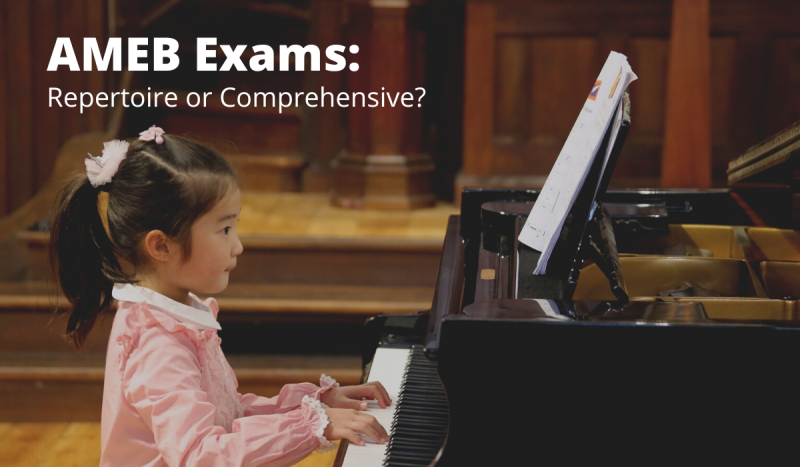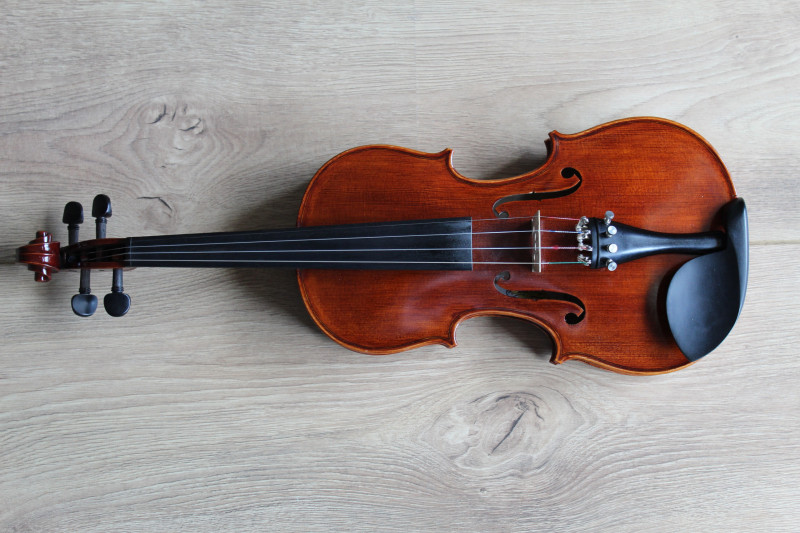
AMEB has a number of structures for students to prepare for their music examination who wish to be accredited for their musical learning.
The two most popular examinations are the Comprehensive and Repertoire examinations. Many students have asked what are the differences and benefits to each examination type. We hope this guide provides some helpful information to choose.
Lets firstly look through what are the requirements for each exam type.
Repertoire Examinations
Although repertoire examinations for Piano, Violin, Flute and Trumpet since 2017, AMEB has made it now available for all instruments. It has been recent times we have been more familiar with this examination structure, due to the restrictions with COVID-19.
Repertoire examinations are available either as face-to-face OR as a video examination.
In repertoire exams, only pieces are examined.
Here are the requirements for repertoire examinations:
Level 1 Repertoire exam (Preliminary to Grade 4)
Candidates will be required to present four works: one from each of Lists A, B and C, plus one Own Choice work of equivalent standard.
Level 2 Repertoire exam (Grades 5 – 8)
Level Two (Grades 5 to 8) Repertoire exam candidates will be required to present a total of five works: three from different syllabus lists, plus two Own Choice works of equivalent standard.
Own Choice Pieces
Own Choice selections should have an educational value similar to that already prescribed in the syllabus. For example, candidates might wish to present an additional work of the same grade selected from the AMEB Manual List, the current grade book, or an earlier series of grade book – or choose a suitable work from another source.
Comprehensive Exams
A Comprehensive exam will be assessing not only the repertoire (pieces) but also the technical work, including scales and exercises. It also consists of an aural test, a sight-reading test and a test on general knowledge.
The comprehensive exam format is only available for face-to-face examinations.
The requirements and criteria for comprehensive examinations may differ according to grade. Please check the AMEB Exam Syllabus or with your teacher for requirements on each grade for comprehensive exams.
Repertoire vs Comprehensive
Lets talk about the benefits or each exam type. At first glance, repertoire examinations may be the preferred choice as it is lighter in terms of its requirements. Since the exam assesses only the pieces, students as well as teachers may feel this is a much more enjoyable approach to their exam preparation.
Although this may be true in some regard, what then are the benefits of preparing for a Comprehensive examination?
As the comprehensive examination is an assessment of the technical component, as well as other important musical aspects, it is a confirmation and accreditation to the student’s overall musicianship.
What are your goals?
As musicians, we all have different goals we want to achieve. The best way to decide whether repertoire exams or comprehensive exams are right for you, think about what your long-term goal is.
These goals may include:
- Completion of all examination grades
- Prerequisite for scholarship application
- Prerequisite for music scholarship application
- Prerequisite for participating in school ensembles or orchestras
- To receive accreditation for your musical learning
This may help to determine which exam type is suitable for you.
Since Repertoire exams only assess the pieces, it can be heavily relied on the student and teacher to make sure other aspects of their instrumental learning are covered and worked on. It does however, grant the student and teacher more flexibility in their preparation and can potentially allow the student to be ready for the exam in shorter time.
As Comprehensive exams cover a wide range of assessment, it gives students the extra incentive to make sure all aspects of your instrumental playing and musicianship are covered. Since all these components are assessed, it almost forces you to make sure they are worked on.
As a result, this solidifies many aspects of your learning, as well as grant you more opportunities in the future.
An example is if a student had aims to apply for a scholarship for a school. They would need a much higher standard in their music if they wished to be successful in their application.
Students do need to dedicate a significant amount of time when preparing for a comprehensive exam. If a student is unable to afford this time, a repertoire exam can be a good alternative as it can be a little more flexible.
Overall, both examination types award you with the recognition and confirmation that the student’s ability and musicianship corresponds to. Examiners will assess students and will provide feedback in the same manner regardless of exam type, only across fewer components in a repertoire examination.
continue reading
Related Posts
It’s important to make sure that a student has the right sized instrument for their learning. Often when a student does not have the right size, it could lead to bad posture, bad technique and
The Suzuki Violin Method books are one of the most popularly used books in the world for violin students. The Suzuki Method is based on Dr. Shinichi Suzuki’s view that every child is born with

